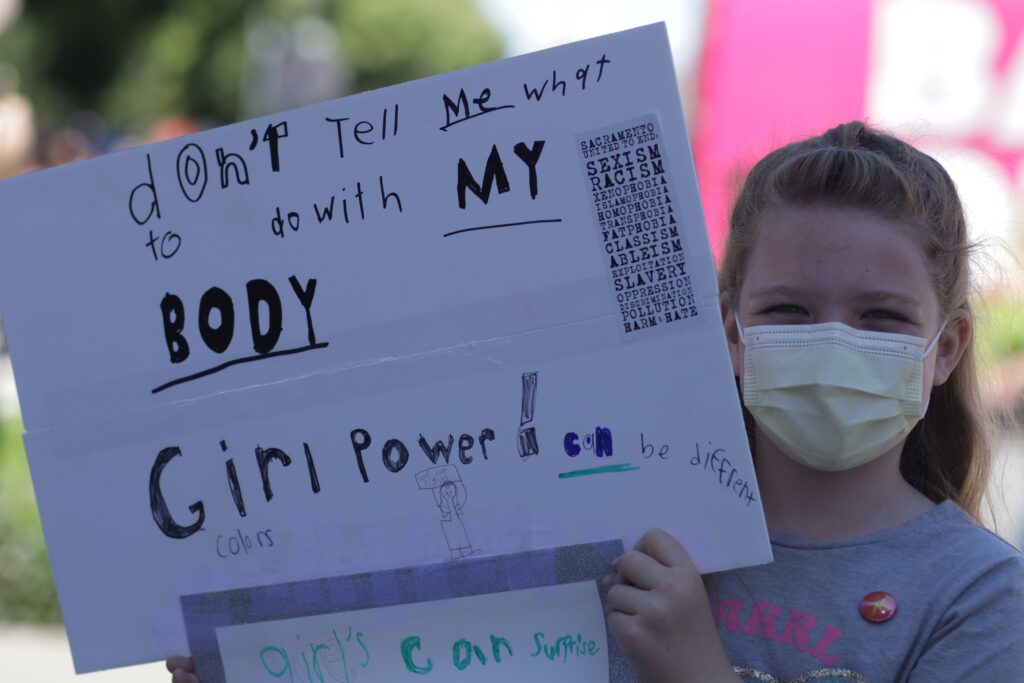As the lines between fiction and reality continue to blur – from the overturning of Roe v. Wade to “Men” – Estonian World sat down with gynaecologist Jaana Below to find out more about abortion access in the US, Estonia and the world at large.
“Men”, a surreal folk horror by Alex Garland, is probably one of this year’s biggest movie sensations. The film follows Harper, who, after the tragic death of her husband, retreats to an old English cottage in the remote countryside. A mysterious stalker from the woods starts following her. Soon, a stalking story turns into a full-blown nightmare, accompanied by Harper’s encounters with creepy local men, her own dark memories and painful emotions.
Despite numerous interpretations that the picture has received from film critics and the public alike, the majority of viewers agree that “Men” has strong feminist, anti-patriarchal connotations. Some would even argue that it’s inspired by a sincere hatred of men as throughout the movie we observe different manifestations of misogyny, sexism and other negative associations with traditional views of masculinity.
Garland’s men are manipulative and abusive. They are also victims of their own toxicity and their desire to control all women, as represented by the protagonist. The “broken” men are being reconstructed over and over – generational trauma passes from a man to a boy, from a boy to a man. Here, the self-destructive nature of toxic manhood knows no age, socioeconomic or racial bounds.
Roe v. Wade
On 24 June, the US Supreme Court ruled in favour of Mississippi’s ban on abortion after 15 weeks, effectively overturning Roe v. Wade, the landmark 1973 decision that guaranteed the constitutional right to an abortion.
Against this backdrop of a film that speaks to a woman’s diminishing bodily autonomy, and a very real-world example of women’s bodies under threat, I caught up with Jaana Below, a gynaecologist, youth counsellor and president of the Estonian Sexual Health Association, to find out more about abortion in Estonia and across the world.
This interview has been edited for clarity and concision.
How did you feel after learning about the new anti-abortion legislation in the US?
It was not a surprise to me – information about the potential overturning of the landmark Roe vs Wade decision has been around for a month or so. Since half of the US Supreme Court judges are conservatives, it could have been expected that things would be steered in this direction. Regardless of this, I was sad to read about it on the news and witness how nearly half of America cheers and rejoices over this decision.
Yeah, it is weird that some women were so ecstatic about this decision.
It is indeed weird, however, public opinion polls show that the majority of Americans support abortions. Some of them support the procedure under certain conditions – but still, most Americans seem to be pro-choice.

What was a bigger surprise for you: the abortion ban in Poland or in the US?
None of these decisions was a surprise really. These things do happen in Europe, just look at the map: you can find abortion restrictions in quite a few places, Malta for example.
What is making modern societies gravitate towards abortion restrictions?
It has much to do with the ruling elites, who are occupying the front rows. The church is also there with its money and lobbying going on.
Religion?
Not quite religion but mostly people who are at the top of the religious organisations. It’s mostly about power and a desire to control. I don’t see the abortion restriction as a tool to protect and save all lives, otherwise, they would also be focusing on helping pregnant women, new mothers and their babies and so on. But this is not a priority in these countries.
The most important thing is to give birth to a child and then God leads…
Yeah, exactly. Then try showing up with your screaming baby somewhere in the cafe…
So, I see that your professional and personal opinion on abortion match?
Yes, they do for sure. I am all the way for freedom of choice, abortion included. The incentive for an abortion does not have to be tragic. It is enough if a person who has gotten pregnant doesn’t want to give birth.

The women who come to you and want an abortion – have they usually made up their minds or are some of them unsure about their decision?
Most of my patients are young people who learned about their pregnancy a week or so before visiting a doctor, so they had time to think about the situation, and are pretty sure about their decision to terminate the pregnancy. Some women want confirmation whether they are pregnant, and they might need time to think or talk to their family or partner. Some of them are directed to social workers or counsellors to discuss different options or to just talk. But most of the patients are sure of their decision.
What are the health risks that come with pregnancy termination?
Overall, a legal abortion procedure in a medical institution is safe. It does not carry any significant complications and will not affect a person’s fertility or future pregnancies. In general, abortion is safer than giving birth.
But there are different abortion procedures, right? Some of them are medicinally induced, and others are surgical…
According to the Estonian abortion legislation, a patient doesn’t have to present any specific reasons for pregnancy termination until the term of 11 weeks and six days. Almost 90 percent of all abortion procedures are done with medications, and the rest of pregnancy terminations are done surgically – the majority with a vacuum procedure.
But the general rule is that the earlier the procedure is undertaken, the safer it is physically and psychologically. From nine to 12 weeks of pregnancy, more surgical abortions can take place but most of them are still done with medication. From 12 to 21 weeks plus six days, pregnancy termination can be made only due to medical reasons, according to Estonian legislation. It still can be done with pills though.

What are the circumstances that usually lead to an undesired pregnancy?
According to the Estonian National Institute for Health Development, half of the people who had an abortion did not use any method of contraception. Among the main incentives for pregnancy termination are financial circumstances, absence of a partner or a partner exhibiting violent traits.
But the most common reason is that the person was just not ready to become a parent. Among younger people, unfinished education is an important matter, however, it is also quite common when a woman who already has two or three children terminates their pregnancy because she doesn’t want more or wants a longer break in between pregnancies.
Is there any correlation between abortion and a person’s socioeconomic background?
Not really. Women choose abortion from every age category and any socioeconomic circumstances.
What about contraception awareness among Estonian youth?
Schools play an important role here. The quality of sex education differs from school to school: if a school has a specialist who can talk about contraception in an adequate way or if not, is a school allowed to invite an outside specialist?
Overall, sex education could potentially prevent some unexpected pregnancies, especially if there are easily accessible youth counselling centres where a young person can get a prescription for contraception.
Unfortunately, some women who do everything right with protecting themselves from pregnancy, still become pregnant. None of the contraception methods are 100 percent effective at preventing pregnancies.

It is widely known that in the Soviet Union, abortion was used as a contraception method. Women went dozens of times to terminate unwanted pregnancies. How many abuse abortion rights in Estonia today?
Yes, in Soviet-era Estonia, abortion was legal and easily accessible, compared with other contraception means. It was one of the family planning methods as there were not that many options really.
There are women who come for abortion procedures five to six times. Some of these patients are the last generations of Soviet women or the ones who got stuck with the Soviet mentality about contraception. However, their numbers are decreasing. Overall, abusing abortion procedures isn’t a trend in Estonia and is far from being seen as a big issue.
What would you say to these women who are afraid of abortions for ethical reasons?
If a person wants to terminate a pregnancy before the 12 -week period… No one really knows at which moment a person becomes a person, like when the soul comes alive in a body…
…when the heart starts beating?
Yeah, the heart might be already beating. However, outside of a female’s body, a fetus will not survive.
But does the fetus feel pain?
We can’t really say. It is not an easy question. However, what is important for us – the medical workers – is what a pregnant person feels or wants. If the person knows that they are not ready to become a parent, to go through nine months of pregnancy, to give birth and raise this child for the next 18 years – eventually, it is more ethical to terminate this pregnancy.

What are the risks of prohibiting an abortion? Will people seek abortions less because of imposed restrictions?
No, they won’t. The number of abortions does not decrease after restrictive legislation comes into force. This usually means the beginning of so-called abortion tourism. Women will go to other countries to complete the procedure or rely on some unsafe traditional medicine tools.
If women do not receive a proper medical consultation, they will go on the internet for advice. Because of Poland, Northern Ireland and some states in America restricting abortions, women began ordering abortion pills on the internet. Luckily, there are quite good resources already.
Overall, when abortions are prohibited in a country, some people will decide to go through with the pregnancy. However, if a person has made up their mind that they do not want this child, they will find a way to get the abortion. Unfortunately, quite often it might not be as safe as a legal abortion procedure.
It’s difficult to be a woman…
It is indeed. Statistics also demonstrate that the death rate of pregnant women in countries where abortion is illegal is higher than in countries where the procedure is not restricted by the law.
How important is a man’s word when his partner gets pregnant?
Hopefully, most couples discuss the issue between themselves and arrive at a common conclusion and go through with it. However, in some situations there can be pressure from a partner: pressure to continue the pregnancy or to terminate it.
When a person comes for abortion counselling, we talk with them and make sure to understand that this is what they really want. However, it is difficult to figure out what their deep motives are, and why they have arrived at this decision. It is important to consider that there are various forms of abuse present in relationships: physical, emotional or economic abuse. So, unfortunately, not all women are completely free to make this decision.
Under economic abuse, you’re implying a situation where a woman is financially dependent on her partner?
Yes, for instance.

What are the long-term implications of overturning Roe vs Wade for the world and Estonia?
I don’t think it will affect Estonia much. Estonian legislation on abortion has been largely intact since the moment of its adoption. This legislation is based on the concept of human rights. Our constitution and international conventions support the right to abortion. But at the same time – we never know. These kinds of precedents can inspire our local conservative forces.
But we are a secular society, aren’t we? Maybe this will save us?
Maybe it will. I believe that bigger changes to the Estonian abortion legislation are not coming anytime soon.
But if it did come, would you go protest on the streets?
I would. When I think about what I would do if I worked as a gynaecologist in some American state where abortions were prohibited – I would not be able to do my work. Would I go to another state or country, will I be forced to violate the law or what would I say to these women? Would I just recommend they order abortion pills online?
I am not able to picture myself in an American doctor’s shoes. It’s incredibly difficult even to think about this situation. How not to offer a person a medical procedure that helps and that they clearly want and need? In some countries, it can go that far, that the woman will not be allowed an abortion even if the fetus has some serious developmental problems or if her pregnancy poses a real danger to her life.
Ruling elites are still male-dominated in today’s world. Why is it so important for men to control women’s bodies even today?
Men probably think that if women only keep giving birth to babies and focus solely on their upbringing, then they will most likely spend time at home, out of sight, and not intervene with “a man’s business”. It is not necessarily that every man thinks this to himself, but it seems like an underlying motive of these political movements.

